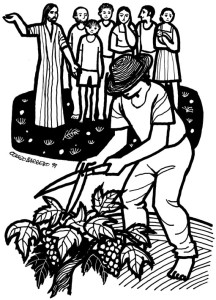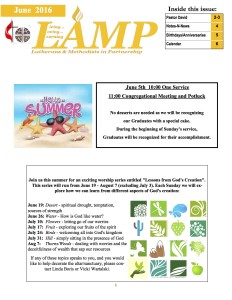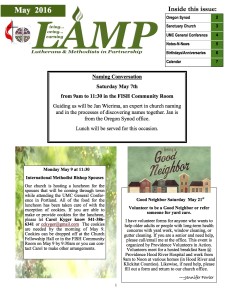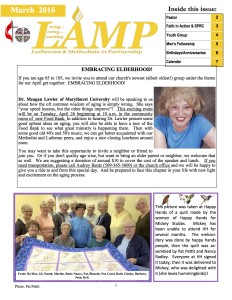Sunday 3 April 2016
The Second Sunday of Easter
John 20:19-31
![]() Thomas. Doubting Thomas. That is how we always seem to remember him. When someone brings up the subject of Thomas, usually we don’t remember anything about him, except, or course, that he doubted.
Thomas. Doubting Thomas. That is how we always seem to remember him. When someone brings up the subject of Thomas, usually we don’t remember anything about him, except, or course, that he doubted.
In the three synoptic gospels—Matthew, Mark, and Luke—Thomas only appears in the list of the twelve whom Jesus called. Like many of the other disciples, Thomas appears only as a member of the crowd. But in John’s gospel, Thomas plays a very important role. After Lazarus dies in chapter 11, Jesus decides to travel back to Judea to visit him. The disciples are afraid to have Jesus return Judea, because they know that he has already made too many enemies there. However, Thomas bravely tells his colleagues: “Let us go also, so that we can die with Jesus.”
Later, at the last supper, Thomas speaks again. When Jesus tells the disciples that he is going to prepare a place for them, Thomas asks how they will know the way to follow him if they don’t know where he is going. Jesus responds that he, himself, is the way, the truth, and the life.
The story we read today is the third time that Thomas speaks in the gospel of John. And we always seem to remember him as the one and only disciple who refused to believe that Jesus had risen from the dead. He had to see for himself, whereas all the other disciples believed in Jesus’ resurrection without having seen.
Of course, that isn’t actually true. The other disciples had already heard from Mary Magdalene that Jesus had risen and appeared to her, and there is no indication from John that any of the disciples believed her. Matthew, Mark, and Luke are all quite emphatic that they did not believe Mary’s story.
So there the disciples are, on the evening of Easter, behind locked doors in some upstairs room, afraid to do anything. Even though the doors are locked, Jesus appears among them. Jesus speaks to them, and says, “Peace be with you.” And before anyone gets a chance to respond, Jesus immediately shows them his wounds so that they will have proof that it is really him. Before he disappears, Jesus tells the disciples that he is sending them out. They are to leave that locked room and start sharing God’s love in the world. But a week later, they are all still gathered there in that locked room.
So, just to be clear, all of the disciples of Jesus, except for Thomas, get to see the risen Christ, get to see his wounds before they believe that he is raised. And even after they have seen the risen Jesus, they don’t follow his directions to go out into the world. They stay cowering behind locked doors. This is not exactly an overwhelming show of belief and faith.
When they tell Thomas what they have seen, Thomas doesn’t believe them. But this isn’t terribly surprising, since they hadn’t believed what Mary had reported to them about Jesus rising. Thomas doesn’t believe before he sees, but neither does anyone else in the story. Mary doesn’t, the other disciples don’t, and Thomas doesn’t. So when Jesus says, “Blessed are those who believe without seeing,” he isn’t talking about anyone else in the story. So who is he talking about? If this were a television show, then this is the moment when Jesus would break the fourth wall, look directly into the camera, and speak to the viewers at home, “Blessed are you who don’t see and yet believe.” Jesus isn’t speaking to anyone in the room; he’s speaking to future Christians, who will be forced to believe based on the testimony of others.
Now, that’s about all we hear about Thomas in the bible. He appears again in the added scene in John when the disciples encounter Jesus along the shore in Galilee when they are out fishing. John tells us more than once that he is known as “the Twin,” but we are never told whose twin he is.
But there are other early Christian sources that tell us more about the story of Thomas. According to multiple ancient accounts, Thomas became an apostle to the east. It is believed that he travelled to India in the years after Jesus’ death and resurrection, founding churches and spreading the good news of Jesus Christ. When Marco Polo travelled through Sri Lanka and India, he found native Christians there, Christians who traced their lineage back to St. Thomas. Again, when Portuguese colonists and traders established sea routes to India, they found native churches there, reading the bible and worshipping in Syriac. According to legend, Thomas founded several churches in India and was martyred there. A church in Mylapore reports to contain the tomb of the apostle. Thomas is the patron saint of India, and there are still Indian Christians today who believe themselves to be part of an unbroken tradition that goes back to Thomas.
I suggest to you today that is time that we stop doubting Thomas. It is time that we stop remembering him as a second-class apostle. Yes, Thomas refused to believe until he had seen some evidence, but so did all of the other early disciples. Yes, Thomas asked questions and wanted to know more. But it is often through our questions, through our doubting and our puzzling that our faith is made to grow stronger. A faith that never questions anything is not a very mature faith, not a faith that is capable of sustaining through trials and tribulations. Thomas may have questioned, but his questions led to one of the most powerful statements of faith contained in the Gospel of John. “My Lord and my God,” Thomas confesses the moment he sees the risen Christ. Not one other of Jesus’ male disciples has a statement of faith so clear as Thomas’s statement here. Not Peter, not James, not John. Of all of the Twelve, it is Thomas who is portrayed as understanding the best who Jesus is. His questions did not lead to a lack of faith. His questions led to a stronger faith.
And that is an example we can learn from. It is sometimes suggested that Christians should never question anything that we have been taught about the faith. We should just believe unchangingly everything that we were taught in second grade Sunday school just as we were taught it. It is suggested that if we were to question our faith, then we would lose it.
But I suggest to you today that is only a very weak faith that can’t stand up to a little questioning. If we never question things, then we never learn, we never grow, we never mature. Thomas questioned things. But his questions led him to be the brave disciple who convinced the others to follow Jesus to the cross, even if it meant they might die with him. His questions led to a greater understanding of Jesus’ nature as the way, the truth, and the life. His questions led to his bold proclamation of Jesus’ identity: “My Lord and my God.” And if the stories are to be believed, his questions led him to spread the Gospel of Jesus farther than any other of the first disciples, all the way to the shores of India. We can learn something from Thomas. And may we be bold enough in our questions and in our doubts that we are strengthened in faith, like Thomas, and empowered to share Christ’s love with the world Christ came to save. Amen.
++ This Sunday, March 20, after the second service we will have an opportunity to meet with 2 financial experts from the ELCA and Synod Endowment Board. Beth Adams, from the ELCA, and Bonny Groshound, from the synod endowment board will be here to talk with the board and finance committee members about strategies to wisely manage and invest the money from the combination of Asbury and ORLC. Anyone from the congregation who is interested is welcome to attend. Bonnie can also offer information about grants that are available from the synod. The meeting will be from 11:45am -1 pm.
Please let me know if you will be attending so I can have a light lunch available for you. If you are on the board or finance committee also please let me know if you are unable to attend. Debby Chenoweth
++ The next Women’s Spiritual Group session is April 2 at 9:00am in the church office building.
++ Men’s Fellowship Group Sausage making this Saturday March 19th at 9am
Hosted by Audrey and Myrin Bentz. Coffee and Pastry will be served in the morning, as well as lunch later on.
Cost for sausage: Per Pound To Be Advised. Donation’s appreciated. Contact: Bob White via email: goirishcream@embarqmail.com
Some sausage will be served at the Easter Breakfast.
++ Men’s Retreat at Morning Song Acres! March 31 – April 2, 2016! The annual spring retreat will use a DVD by Rev. Adam Hamilton, “Christianity and World Religions: Wrestling with Questions People Ask” as the basis for the three day study. It will give us an open minded perspective on the world’s religions to enhance our discussions and our spiritual lives. See Marv Turner, Bob White, Myrin Bentz, or Rick McBee to sign up and get involved.
++ Photographs for our Church Directory Easter Sunday—starting at 8:30am and through the Easter Breakfast time, Gordon Leigh’s Positive Negatives will be taking pictures for the church directory. This is a no cost service, so come dressed for Easter and your pictures! If you would like prints for yourself, price information will be available for that additional service. Come and enjoy the services, the breakfast, and let’s get as many photos done as possible for our new directory. —-Rick McBee
++ We are using Ecopalms for Palm Sunday again this year!
Why a “Fair Trade” Palm?
Gatherers will receive a higher price for their “fair trade” palms improving their income and living conditions. “Fair trade” helps protect the palms and the important forests from which they are gathered through sustainable harvest programs.
Blessings!
Jennifer Fowler
Today Asbury Our Redeemer Partnership voted to accept a constitution that makes us officially and permanently one congregation related to two denominations. To the ELCA we are considered a federated congregation; to The UMC we are considered a union congregation. That means that every member of AORP is considered a member of an ELCA congregation, and every member is considered a member of a UMC congregation. We are one! Hallelujah!
For the last several months, Pastor David, Debby Chenoweth, Donna Fitch, and Jean Sheppard have been working to draft a constitution for our congregation. We have consulting the governing documents of both the ELCA and the UMC, carefully reviewed our current provisional covenant, and conferred with denominational leaders, particularly Bishop Dave Brauer-Rieke of the Oregon Synod (ELCA) and Rev. Steve Ross of the Columbia District (UMC). After several drafts, we have a document that we’re proud of, and we’re ready to share it with you, the congregation, for your review. This version has already been reviewed and approved by Bp. Dave, Rev. Steve, and your Board of Directors. You can find the constitution here, or there are print copies available in the narthex, as you walk into the sanctuary.
Beginning in November, I will be visiting many of the small groups of the congregation to see if you have any questions or comments about this draft. I’m also scheduling two information sessions on Sunday, November 15th, at 8:00 am and 11:30 am, for anyone who would like to hear a summary of the constitution, ask questions, and make comments. In the Sundays between now and then, I’ll be sharing a few highlights during announcements at both worship services. Also, please feel free to contact me directly with any questions.
Your servant in Christ,
+Pastor David
Our congregation was featured in Rev. Lowell Greathouse’s Spirit Alive column this week. Check it out here.
Sunday 3 May 2015
The Fifth Sunday of Easter
1 John 4:7-21
John 15:1-8
 I’ve never been much of a gardener. It’s a bit of a shame to my mother. In the house where I grew up the first twelve years of my life, my parents had a vegetable garden that was bigger than the entire lot of the house where we live now. And that doesn’t count the fruit trees, or the roses, of the cedars, any of the other plants. We had ducks, complete with their own pen and pond. It wasn’t because we used the eggs or anything. The ducks were there for one purpose and one purpose only: when they were let out into the garden, they would eat the slugs that threatened my mother’s plants.
I’ve never been much of a gardener. It’s a bit of a shame to my mother. In the house where I grew up the first twelve years of my life, my parents had a vegetable garden that was bigger than the entire lot of the house where we live now. And that doesn’t count the fruit trees, or the roses, of the cedars, any of the other plants. We had ducks, complete with their own pen and pond. It wasn’t because we used the eggs or anything. The ducks were there for one purpose and one purpose only: when they were let out into the garden, they would eat the slugs that threatened my mother’s plants.
When I was twelve, our family moved to town for the first time ever. Now instead of five acres to work with, Mom had to make due with a mere third of an acre. But in the twenty years since we moved to Salem, she has transformed that yard. It’s gone through a several cycles now. There was the year that she grew more than two hundred hanging fuchsia baskets. There was the year she grew seventy different varieties of tomatoes. Did you know there are purple tomatoes? There are. There was the experiment in square-foot gardening: in which each square foot is planted with something different, and each square keeps changing throughout the season.
Over the last several years, she has moved increasingly to growing edibles. Virtually everything that she plants now, from the trees to the ground cover to the windbreak, can be eaten. And a good portion of what she grows goes to her local food bank. She is a certified Master Gardener. She’s a member of the fuchsia society. She volunteers at the Oregon Garden. She’s a seed saver.
So, like I said, I think it’s a bit of a disappointment that the most gardening her son seems to be able to do is to mow the lawn, and even that, not often enough. I’ve never really gotten into it. I was always pretty good at driving little John Deere tractor with the tiller on the back, but I never really got interested in the plants.
And yet, even someone as horticulturally challenged as me can understand the gardening metaphor that Jesus uses to describe himself in the Gospel of John this morning. “I am the Vine, you are the branches. When you’re joined with me and I with you, the relation intimate and organic, the harvest is sure to be abundant. Separated, you can’t produce a thing. Anyone who separates from me is deadwood, gathered up and thrown on the bonfire.”
It doesn’t take much gardening sense to know that a branch that has been removed from its tree, from its vine, from its root, will not last very long. Even if all I know about gardening is mowing the lawn, I can understand that. Once that grass is severed from its root, it’s going to die, dry up, and decay.
And so, it makes sense that we, as spiritual beings, can experience the same thing. If our connection to God is severed, we are going to die, dry up, and decay. Spiritual decay may not be as obvious as the physical decay of a severed branch, but it can be just as devastating.
As Christians, we experience our connection to God through Jesus Christ. Jesus is our vine, the conduit through which we receive what we need to be spiritually alive and healthy. Jesus is what connects us to the root.
Plants use roots to gather up moisture and nutrients. And then that water and those nutrients travel through the plant’s structures, through the trunk or vine, into all of the branches of the plant. Plants need that water, need those minerals, in order to survive. That’s why a branch that is cut away will die: it’s no longer connected to its source of life.
So what are the nutrients that we receive through Jesus? What is the water that flows to us through the Christ? Well, if we’re talking about water, then we have to talk about baptism. Baptism is how we are brought into God’s family. Baptism is how we are adopted as God’s children. And it is through that relationship with God, that relationship of parent to child with the all-present sovereign of our universe, that we receive grace, forgiveness, mission, vocation. Through the water of baptism we receive identity. Through the water we receive community, community with God, but also community with our sisters and brothers, who are all created in God’s image. Community, ultimately, with all created beings, in this interconnected and interdependent web of life that is our world, that is our galaxy, that is our universe. That is the deep water that we tap into through our relationship with Christ Jesus.
We are spiritual beings, after all, though we sometimes forget it. We are made to be in relationship with God, in relationship with each other, and in relationship with all the world. We are meant to share spiritual communion with all that God has made.
But we can’t do it on our own. We need that ongoing connection through Jesus to God, a connection that comes in the form of spiritual practice. It’s through singing the songs of faith. It’s through struggling with the message of scripture, through sharing in the common meal. It’s through giving thanks in our times of joy, through crying out in our times of grief. It’s through prayer and meditation, and spiritual conversations with our neighbors. It’s through recognizing the signs of God’s handiwork in the marvelous creation all around us. This is how we stay connect to God. This is how we nurture our spirits.
It can be hard in our modern world. In an age of science, too often we forget about the spiritual. And even when we do remember that we’re supposed to connect with God, sometimes we don’t really know how. Neither Lutherans nor United Methodists are usually very good at sharing faith with someone else. We may have grown up all our lives in church and never really been taught how to pray, or how to use the scriptures in our own devotions, or how to have an honest, open spiritual conversation with another human being. We may know a lot about the faith, but sometimes we have a hard time experiencing it. It doesn’t have to be hard. And the wisdom we need we can find right here in this community. Tapping in to our spiritual roots is something we need to continue to work at, and I look forward to us finding new and meaningful ways for us to do just that. Because we know that if we are separated from our spiritual source, we cannot thrive.
But what if we are well-connected to spiritual roots? What then? What is it all for? Is it just so that we can feel good about ourselves, so that we can feel self-actualized?
No. God isn’t growing a show garden. It’s not just about looking pretty, or happy, or holy. No, God is growing a production garden. As Bishop Dave told us at the Lutheran Synod Assembly last week, “It’s all about the fruit!”
And that’s what Jesus says about it too. God is constantly pruning the plant that is the church. It’s not being pruned in order to make it more beautiful. God isn’t in the business of making topiary. It’s being pruned in order to make it more fruitful.
So, what kind of fruit is God trying to grow? Well, put most simply, it’s love of our neighbors. And love for neighbor can take many forms. It could be something as simple as kindness in our everyday dealings with people, in giving others the benefit of the doubt, in seeking forgiveness and reconciliation when we have done wrong. It could be working actively to bring about God’s kingdom in the world, by growing food for the hungry, by seeking an end to preventable diseases like malaria, by offering a helping hand to those who have experienced loss or devastation. It could be working for justice, not simply justice in individual cases of injustice, but working for a change to systems that perpetuate injustice, bigotry, and oppression. These are the fruits that God is cultivating in us. This is the produce of a life rooted in faith.
There are two parts. There is the staying rooted in God through Jesus, that brings us the sustenance to grow and thrive. But then there is the producing of fruit. We’re not always good at doing them both, but we need them both. If we try to do good in the world without developing our spiritual selves, then we won’t be able to sustain our work. We will shrivel and die. But if we spend all our time in prayer and devotion but are never led into ministry in the world, then we are a terrible waste of resources.
It is by bridging the two that we become true disciples. It’s by bridging God and the world, by bridging personal holiness and social holiness, by bridging spirituality and mission that we become what God wants us to be. Because, while we can’t thrive in the world without a connection to God, God has a hard time acting in the world without a connection to us. God has no hands but our hands. When we are deeply connected to God in Jesus Christ, and when God prunes us into fruitfulness in the world, we, together, become that living bridge that connects communities with God’s grace.
Our faithful garden volunteers have raised thousands of pounds of fresh produce for the food bank in past years. As the FISH building moves steadily toward completion, interest in the gardens is growing.
- HRMS 8th graders in Michael Becker’s class are working on a landscape plan for the property to incorporate edible perennials and insect-attracting plants.
- An instructor at Klahre House has approached us to see if her students can help with weeding or other projects.
- We have received funding to hire a garden volunteer coordinator to work with community groups and individuals interested in helping with the gardens.
It is amazing to watch how God is multiplying our efforts to nourish both body and spirit.



